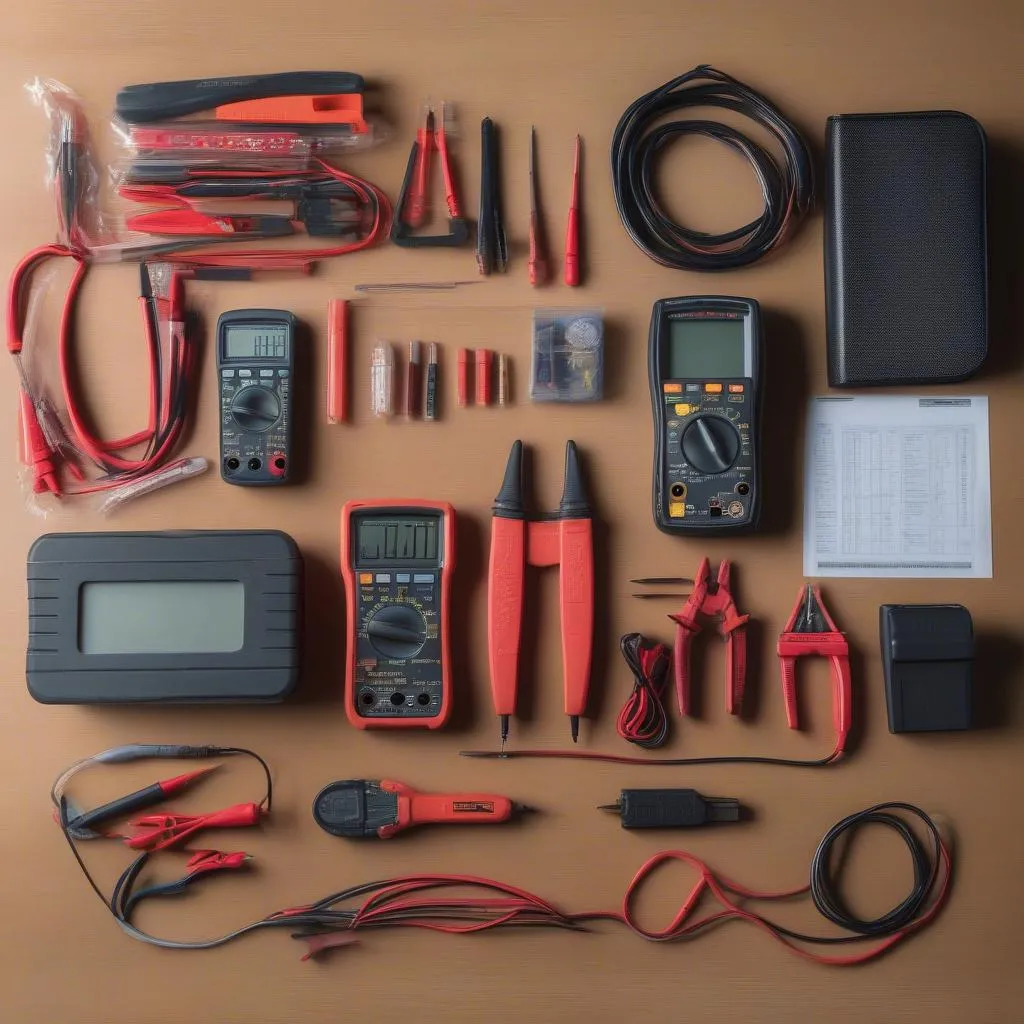Imagine this: you’re cruising down the Pacific Coast Highway, California sun warming your face, when suddenly your car sputters and dies. You pull over, heart sinking, knowing something’s wrong. But what? This, my friends, is where the magic of electrical testing tools comes in.
What are Electrical Testing Tools, and Why Should You Care?
Whether you’re a seasoned mechanic in a bustling Berlin workshop or a car enthusiast tinkering in your Detroit garage, understanding the language of your car’s electrical system is crucial.
For the Pros:
- Accurate Diagnostics: Imagine trying to find a faulty wire in a labyrinthine wiring harness without a multimeter. Electrical testing tools provide the eyes and ears you need to quickly pinpoint electrical gremlins.
- Time is Money: In the fast-paced world of auto repair, time wasted is profit lost. These tools streamline the diagnostic process, allowing you to get your clients back on the road faster.
- Professionalism & Trust: Using specialized tools like oscilloscopes and dealer-level scanners (like the ones we discussed in our article on Dealer Scanner For European Cars) demonstrates expertise and builds customer confidence.
For the DIYer:
- Empowerment: Understanding the basics of automotive electricity and having the right tools can help you diagnose and even fix minor electrical issues yourself, saving you a trip to the mechanic.
- Preventative Maintenance: Regular checks with a multimeter, for example, can help you identify potential battery problems or wiring issues before they leave you stranded.
- A Deeper Connection: Working on your own car, even if it’s just basic electrical troubleshooting, can foster a sense of pride and connection with your vehicle.
The A-Team of Electrical Testing Tools:
Just like a surgeon needs a scalpel, diagnosing electrical issues requires the right tools for the job. Here are some heavy hitters:
- Multimeter: The Swiss Army knife of electrical testing. It measures voltage, current, resistance, and more, making it invaluable for everything from testing batteries to checking continuity in circuits.
- Test Light: This simple tool quickly determines if power is present in a circuit. A lit bulb means you’ve got juice!
- Circuit Breaker Tester: Suspect a blown fuse isn’t the culprit? This handy tool confirms if a circuit breaker is working correctly.
- Oscilloscopes: This sophisticated tool allows you to visualize electrical signals, essential for diagnosing complex issues in sensors, actuators, and communication networks.
- Scan Tools: From basic code readers to advanced dealer-level scanners, these tools communicate with your car’s computer, revealing hidden fault codes and live data.
 Automotive Electrical Testing Tools
Automotive Electrical Testing Tools
Common Questions About Electrical Testing Tools:
Here at DiagXCar, we get it. Cars are complex, and sometimes you need a little help. Here are some frequently asked questions we receive:
1. “What’s the best multimeter for a beginner?”
Start with an affordable but reliable digital multimeter with basic functions. As you gain experience, you can explore more advanced models.
2. “Can I use a test light instead of a multimeter?”
While a test light can be useful for basic checks, it doesn’t provide the detailed information a multimeter does, especially for measuring voltage and resistance.
3. “Do I need a dealer-level scan tool?”
For basic diagnostics and code reading, an affordable OBD-II scanner might suffice. However, if you’re working on European cars or need access to advanced functions like module coding, a dealer-level scanner like the ones we reviewed here is a worthwhile investment.
4. “What are some common symptoms of electrical problems in cars?”
Dimming headlights, slow starting, malfunctioning accessories, and warning lights on the dashboard are all telltale signs of potential electrical issues.
Beyond the Tools: The Importance of Knowledge
Having the right tools is essential, but it’s only half the battle. Just like a skilled carpenter understands wood grain and joinery techniques, a competent mechanic possesses in-depth knowledge of automotive electrical systems.
Here are some resources to boost your electrical know-how:
- Online Forums: Connect with fellow enthusiasts and experienced mechanics for advice and troubleshooting tips.
- Repair Manuals: Invest in a comprehensive repair manual for your specific car model. It’s like having a seasoned mechanic whispering secrets over your shoulder.
- Training Courses: Consider enrolling in automotive electrical courses offered by technical schools or online platforms.
 Mechanic Diagnosing Electrical Issues Under Car Dashboard
Mechanic Diagnosing Electrical Issues Under Car Dashboard
Need Help with Your Diagnostics?
We understand that navigating the world of automotive electronics can be daunting. If you need assistance with choosing the right tools or require expert guidance, don’t hesitate to reach out. Our team of automotive specialists is available 24/7 via WhatsApp at +84767531508. We’re here to help you get back on the road and keep your car running smoothly.
Keep the Spark Alive!
Mastering automotive electrical diagnostics is an ongoing journey. Embrace the challenge, invest in the right tools and knowledge, and you’ll be well on your way to confidently tackling any electrical gremlin that dares to cross your path. Happy wrenching!
Want to learn more about specific scan tools and diagnostic software? Check out our articles on:
We’d love to hear from you! Share your electrical troubleshooting experiences and questions in the comments below. Let’s keep the conversation going!